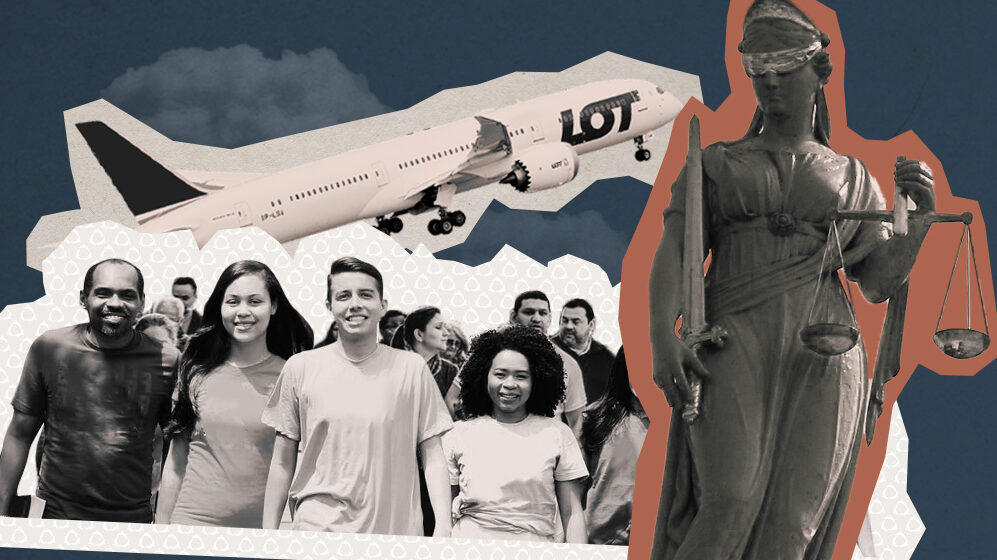Updating business managers with what you need to know, right now:
Our quarterly business law update looks at a host of legal issues affecting both employers and employees. Employment Lawyer Blair Curtis shared with us his insight on the legalities of employer-mandated vaccines, the impacts of the pandemic on severance rulings, and a gender wage discrimination study involving Canada’s legal industry. Immigration Lawyer Stanley Leo updated us on border issues, the IRCC’s attempts to overcome a processing backlog, and the recent and large invitation for Canadian Experience Class Candidates in Express Entry.
Pressed for time? Skip ahead.
Employment Law with Blair Curtis
- S01:01 Forcing employees to take vaccines
- S01:02 Impact of pandemic on severance packages
- S01:03 Canadian law industry pay gap
Immigration Law with Stanley Leo
- S02:01 Impact of vaccines on immigration
- S02:02 Call for Canadian Experience Class candidates
- S02:03 Processing backlog at IRCC
- S02:04 Foreign workers by industry
Interview with Blair Curtis, Lawyer at Tevlin Gleadle Curtis
S01:01
Forcing Employees to Take Vaccines
GB: As the vaccine rollout continues and people return to the workplace in greater numbers, is it possible for employers to mandate that their employees get vaccinated?
I’d be really hesitant to advise an employer that they can require someone to get a vaccine. There are pretty limited circumstances where, as an employer, you can force anything medical on your employee.“
GB: If an employee refuses to get vaccinated, can they be relegated to a different set of tasks that allow for more isolation?
If you make changes in someone’s employment that aren’t really authorized, then you’re taking the risk of a constructive dismissal type of claim. They might say you’ve constructively dismissed them by changing the terms of employment. If you prevented an unvaccinated sales employee from making sales visits, that
might result in lowered commissions, which the employee might assert is a form of constructive dismissal.
GB: In your opinion, are employers being given adequate information with which to make these decisions?
I think that the government could be giving a whole lot more guidance to employers about what they can and should do, but they’ve been very vague in their messaging. I’ve heard these radio jingles throughout Covid saying, ‘remember, as a worker, you have a right to refuse unsafe work.’ OK, thanks! What does that mean? I’ve had calls from employers saying that their workplace is perfect and that they’ve complied with everything they’ve been told to do, yet certain employees still won’t come to work. Can they fire them? Are the employees right?
Generally speaking, you have a very limited scope to force people to do things with regards to medical issues. If someone arrives in such a condition that they’re not fit to work or if they pose a safety hazard in an industrial setting, you can advise them to get medical attention, but forcing someone to undergo a certain medical treatment is a whole other ball of wax. Our government doesn’t want to do it, and I can tell you employers want to do it even less. They’re worried about whether they have those rights and whether they’d be violating some kind of law by doing it. The government is putting the employer in a very difficult position with the lack of clear guidance.
S01:02
Impact of Pandemic on Severance Packages
GB: Some have suggested that the pandemic could have an impact on severance packages, particularly ones that are decided in court. Have you seen this bare out?
A trio of cases in Ontario could offer a hint on this. Severance packages generally seek to provide relief and financial stability to the dismissed party while they seek new employment. In each case, the plaintiffs argued that the timing of their dismissal, near the beginning of the pandemic, had complicated their job search and called for a more generous package.
In two of the cases the courts ruled that, since the employee was terminated prior to the emergence of Covid-19, the pandemic shouldn’t be a factor. In the third case, (in which the plaintiff had been released after the onset of the pandemic) the courts said that, while it’s difficult to say exactly what the effect of the pandemic was on their job search, they were prepared to tilt up the severance package.
GB: So this constitutes a ‘tilt up’ rather than a moving of the goal posts?
There’s generally a range of what would be an expected outcome for a person, depending on years of service, level of employment, age, and other factors. I think what the judge was saying in that particular case was, because you were terminated during Covid, I’m prepared to tilt you up toward the higher end of what the reasonable range would be.
GB: How would you see these cases playing out in British Columbia?
I believe the BC courts will consider Covid on a limited basis and look at what effect it had on the person’s ability to find another job. I am aware of one recent severance case in BC Supreme Court where the judge addressed the Covid pandemic by ruling that economic circumstances arising post-termination “such as those from the COVID-19 pandemic” can be relevant if they impact the availability of equivalent employment.
GB: Are CERB Payments Deductible from Severance Pay?
Earnings gained during a severance period have typically been deductible from severance packages, but the courts have made exceptions for EI. This, of course, begs the questions of whether or not CERB payments are deductible.
There’s only a single case to draw upon, which, again, took place in Ontario. I’m not sure about the reasoning, frankly, but ultimately the court decided that they would not deduct the CERB. They didn’t say specifically that it’s the same as EI. It was almost as if they decided that it wasn’t that much money anyway and, since we’re not 100% sure about the terms of the plan, we’re not going to deduct it.”
GB: Did this ruling come as a surprise to employers?
I think a lot of employers who had to let people go during the pandemic were thinking that if a person has gotten a couple thousand dollars a month from the government, they shouldn’t have to pay it again as severance. This Ontario case goes against employers in that sense. It basically says this person gets to keep the CERB and get the full severance.
S01:03
Canadian Law Industry Pay Gap
GB: Another issue making headlines of late has been the willingness of several major Canadian law firms to release wage gap data as part of a study into the issue. What are the consequences for these firms if a gender pay gap is discovered?
There may be a key distinction between “associates” and “partners” here. In my experience, male and female associates are often paid the same amount based on their years of call. But there can be big differences in what partners at law firms earn. However, the firms might be somewhat insulated from a true discrimination claim on the basis that partners aren’t necessarily true employees. My law firm once had an opportunity to argue an age discrimination case before the Supreme Court of Canada involving a partner at a national law firm. Unfortunately, the SCC ruled that our client was not covered by human rights protections, because he was a partner, not an employee.
Despite this, I think it always matters from a perception point of view; it matters for attracting and retaining female talent and for the happiness of your female workforce.
Interview with Stanley Leo, Lawyer at Lowe & Company
S02:01
Impact of Vaccines on Immigration
GB: There is a certain degree of vaccine optimism. Do you foresee our borders re-opening any time soon?
Vaccines are not even being considered right now in terms of how it affects someone’s ability to travel to Canada. My sense is that with the identification of the variants and the uncertainty of the vaccine effectiveness against variants, internationally speaking, they’re probably not going to start lifting restrictions any time soon.
I think they’re trying to ensure that domestically we can return to some kind of normal faster, so I guess part of the idea of restricting people coming in is that you are able to allow your own population to work things out first. What that means for new workers is hard to say. True confidence will probably only be achieved once we’re vaccinated to a sufficient level. With the slow rollout, I just don’t really expect there to be too much change in the next year.
S02:02
Call for Canadian Experience Class Candidates
GB: In February of this year there was an unexpectedly large Express Entry invitation for 27,300 Canadian Experience Class candidates to apply for permanent residency. Isn’t that much higher than normal?
Yes. A typical invitation would range from 3,500 to 5,000. I attribute the size to a desire to meet Canada’s higher immigration targets for this year and an expectation that most of the candidates are already in Canada, theoretically simplifying the process for everyone involved.
GB: What are you telling people that would like to apply for permanent residency?
The invitations made on 13 February 2021 have thrown off expectations in a significant way. There have been many inquiries from people that previously would have been way below the minimum requirement range to even be considered for getting an invitation to apply for permanent residence. My general comment is that if someone qualifies, then they might as well create a profile to put their hat in the ring, so to speak. The high intake quota indicates that applicants who would not ordinarily have been competitive could be successful this year and this might never occur again. At this point, Canada is not really favouring people who are outside Canada but I have no idea how long that’s going to continue.
S02:03
Processing Backlog at IRCC
GB: All organizations have faced challenges as a result of Covid-19. Have the IRCC been able to keep up with processing?
Total processing for PR and temporary residence applications last year was down about 50% but there has been an uptick in processing lately. My understanding is that they had a lot of employees who could not work from home last year. They just, literally, couldn’t do their work. That’s partly a result of antiquated systems. It’s frustrating for all parties involved.
One of the things that was kind of amusing in a wry sort of way, I think it was in November, the government Tweeted that they had found a way to digitize applications. Many immigration lawyers and consultants responded, ‘We scan everything. You guys found a scanner? What do you mean?’ That’s just an example of the struggles they had. The mere ability to digitize applications was a challenge.
GB: How did the large Express Entry invitation impact this already challenging situation?
There has been a lot of discussion how this was a win and it is indeed a win for many people. As far as government planning goes however, it did leave a lot of us scratching our heads. We have clients with applications that were submitted last year which are still in process and for no other reason, as far as we can tell, other than that they are just taking a long time.
GB: Are the processing backlogs ongoing?
I think they’re doing their best. Recent information about increased hiring of immigration officers is helpful. Overall, there is starting to be an improvement in processing times. Just today I received an approval for a work permit extension in less than a month. At the end of last year, we were looking at 3, 4, even 6 months in some cases, for something as simple as a work permit extension. Visa application centres are now mostly open all across the world, minimizing the closures that had been a problem for a lot of people. When they were closed, you just couldn’t do anything to move your application along.
S02:04
Foreign workers by industry
GB: Are you seeing any change with regards to which industries are hiring foreign workers?
Frankly I have not seen any major shifts in that personally. Farm workers are by far the largest with 7,425 last year. The next largest was cooks, which was 1470. I expect when summer rolls around, you’re going to see that again.
Aside from that, there’s a lot of carpenters, and then software engineers. The IT part is not surprising, because of the prioritization of the IT industry in several different programs.
Over a year into the pandemic, the road ahead is still not certain. While the vaccine rollout has created a sense of optimism for many, questions remain regarding workplace and immigration procedures, as well as the related legal and economic ramifications. Both employers and employees will continue monitoring the situation closely.




